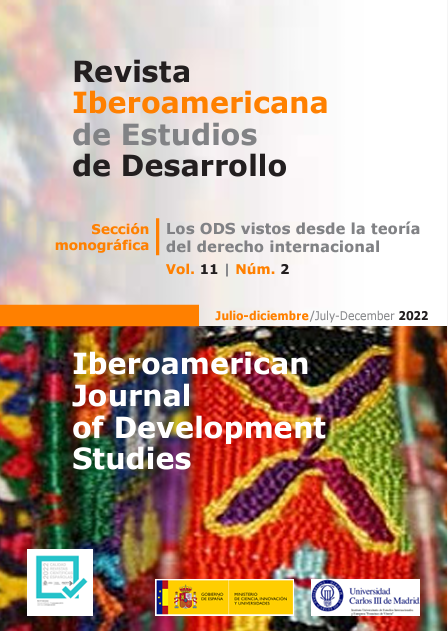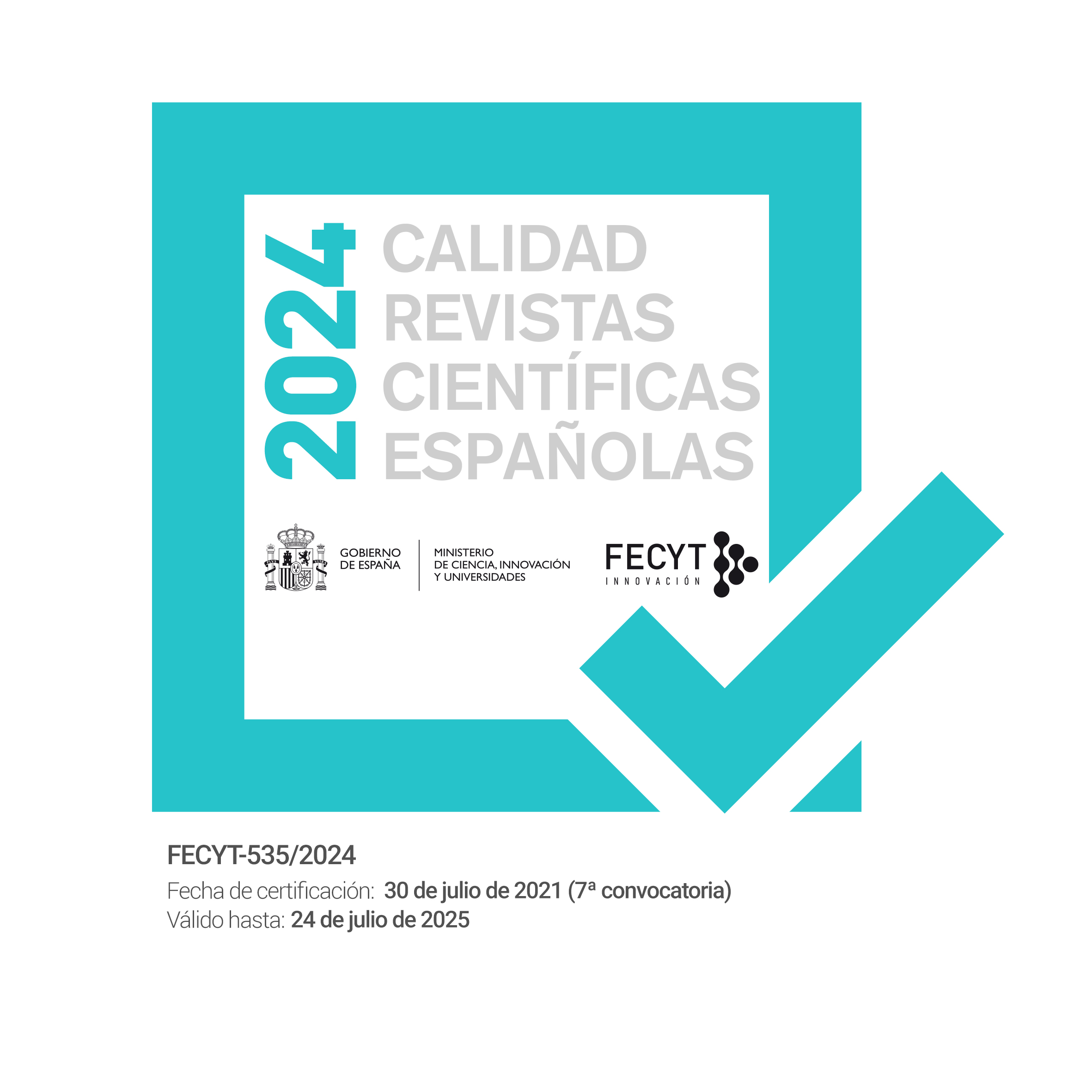Sustainable Development in international relations theory: its presence or abscence. A proposal for a new paradigm
DOI:
https://doi.org/10.26754/ojs_ried/ijds.682Keywords:
paradigms, theories, International Relations, Realism, Structuralism, Liberalism, Reflectivism, Sustainable DevelopmentAbstract
Along with the goals and targets set up by the United Nations in the 2030 Agenda, the concept of Sustainable Development has a great significance in the discipline of International Relations, since the beginning of the new century. In fact, contents studied and analyzed by International Relations are very linked to practically all the issues addressed in the Sustainable Development Goals (hereinafter, SDGs). First, this paper aims at showing and analyzing the gradual incorporation of Sustainable Development into the theory of International Relations. Second, it raises a need for a mainstream that contributes, on the one hand, to the theoretical development of the discipline and, on the other, to the progress towards sustainability and that of the planet through the attainment of the SDGs. The mentioned mainstream could be called «Sustainable Development Paradigm».
Downloads
References
ADAMS B (1993). Sustainable Development and Development Theory. In: Schuurman FJ (ed.). Beyond the Impasse: New directions in development Theory. Zed Books, London, pp. 207-222.
AGUILAR-HERNÁNDEZ E (2018). La visión de la sustentabilidad en las relaciones internacionales: superando el desarrollo sustentable. Miríada 14:265-279.
ARENAL C DEL (1989). La teoría y la ciencia de las relaciones internacionales hoy: retos, debates y paradigmas, Foro Internacional XXIX 4:605, México.
ARENAL C DEL (1993). El nuevo escenario mundial y la teoría de las Relaciones Internacionales. Homenaje a don Manuel Díez de Velasco, trabajo coordinado por Manuel Pérez González.
ARENAL C DEL (2014). Etnocentrismo y teoría de las Relaciones Internacionales: una visión crítica. Tecnos, Madrid, pp. 13 and 51.
ARENAL C DEL, SANAHUJA JA (2015). Teorías de las Relaciones internacionales. Tecnos, Madrid, p. 35.
BARBÉ E (2007, 2020). Relaciones Internacionales. Tecnos, Madrid.
BARBÉ E (2020). El invierno que no llegó: el orden internacional en tiempos de pandemia. REDI, vol 72/2/2020:15-31.
CEPAL REVIEW (1980). Informe Biosphere and Development.
COLACRAI M (2000). Coexistencia y diversidad de enfoques teóricos: apuntes para abordar la complejidad actual de las relaciones internacionales, Agenda Internacional, vol. 7 14:57.
CORNAGO N (2015). Introducción al Postestructuralismo para Internacionalistas. In: Arenal C. del, Sanahuja JA. Teorías de las Relaciones Internacionales. Tecnos, Madrid, pp. 221-240.
COX RW (1981). Social Forces, States and World Orders: Beyond International Relations Theory, Millennium: Journal of International Studies, vol. 10 2:128.
COX RW (1983). Gramsci, Hegemony and International Relations: An Essay in Method. Millennium: Journal of International Studies, vol. 12 2.
DÍAZ BARRADO CM (2016). Los objetivos de desarrollo sostenible: un principio de naturaleza incierta y varias dimensiones fragmentadas. Anuario Español de Derecho Internacional, vol. 32/016:9-48.
DU PISANI JA (2006). Sustainable development-historical roots of the concept. Environmental Sciences, vol. 3:89.
INNERARLTY D (2011). La democracia del conocimiento. Paidós Ibérica, Madrid.
JACOB M (1997). Critical Theory in Political Practice: Sustainable Development and Development Theory, Science, Technology and Society, vol. 2:99-129.
KEOHANE R (1988). International Institutions: Two Approaches. International Studies Quarterly, vol. 32:4.
KEOHANE R, NYE J (1971). Transnational Relations and World Politics. Harvard University Press, Cambridge.
LAPID Y (1989). The Third Debate: On the Prospects of International Theory in a PostPositivist Era. International Studies Quaterly, vol. 33 3.
LATOUCHE S (2007). Sobrevivir al desarrollo. De la descolonización del imaginario económico a la construcción de una sociedad alternativa. Icaria Editorial, Barcelona.
LINKLATER A (1992). The Question of the next stage in International Relations Theory: A critical-theoretical point of view. Millennium: Journal of International Studies, vol 21 1.
LUTERBACHER U, SPRINZ DF (2001). International Relations and Global Climate Change. MIT Press, London.
PREBISH R (1949). El desarrollo económico de la América Latina y algunos de sus principales problemas. El Trimestre Económico, vol. 16 63(3). Fondo de Cultura Económica.
RODRIGO A (2015). El desafío del Desarrollo Sostenible: los principios del derecho internacional relativo al desarrollo sostenible. Marcial Pons, Madrid.
SALOMÓN M (2002). La teoría de las Relaciones Internacionales en los albores del siglo XXI: diálogo, disidencia, aproximaciones. Revista Electrónica de Estudios Internacionales (REEI) 4.
SANAHUJA J A (2014). De los Objetivos del Milenio al desarrollo sostenible: Naciones Unidas y las metas globales post-2015. In: Mesa M. (coord.). Focos de Tensión, cambio geopolítico y agenda global, Anuario 2014-2015, CEIPAZ, Madrid, pp. 49-84.
SANAHUJA JA (2018). Reflexividad, Emancipación y Universalismo: Cartografías de la Teoría de las Relaciones Internacionales. Revista Española de Derecho Internacional, REDI, vol. 70/2.
SMITH S (1995). The Self-Images of a Discipline: A Genealogy of International Relations Theory, International Relations Theory Today, pp. 18-19.
TAH AYALA ED (2018). Las Relaciones Internacionales desde la perspectiva social. La visión del constructivismo para explicar la identidad nacional. Revista Mexicana de Ciencia Política y Social, vol. 63 233.
THEYS S (2018). Introducing Constructivism in International Relations Theory. E-International Relations.
TICKNER JA (1992). Gender in International Relations. Columbia University Press, New York.
TICKNER JA, TRUE J (2018). A century of International Relations Feminism. From World War I Women’s Peace Pragmatism to the Women, Peace and Security Agenda, International Studies Quarterly, vol. 62.
TOLEDO V, ORTIZ-ESPEJEL B (2014). México, regiones que caminan hacia la sustentabilidad. Una geopolítica de las resistencias bioculturales. Ibero Puebla, Puebla.
WENDT A (1992). Anarchy is what states make of it. International Organization, vol. 46 2.
WENDT A (1999). Social Theory of International Politics. Cambridge University Press, Cambridge.
ZIMMERN A (1936). The League of Nations and the rule of law, 1918-1935. Macmillan, London.
Downloads
Published
How to Cite
Issue
Section
License
Copyright (c) 2022 Sagrario Morán-Blanco

This work is licensed under a Creative Commons Attribution-NonCommercial-NoDerivatives 4.0 International License.








